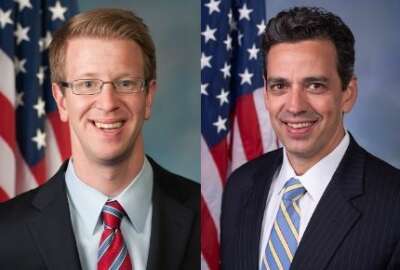
White House lays out issues with House’s minibus spending bill
In today's Federal Newscast, the White House threatens to veto the House's minibus to fund a large amount of agencies.
To listen to the Federal Newscast on your phone or mobile device, subscribe in PodcastOne or Apple Podcasts. The best listening experience on desktop can be found using Chrome, Firefox or Safari.
- The initial reaction from the White House on the minibus spending package the House passed on Friday says it would veto the bill should it make it to the President’s desk. Among the several provisions it objects to is the provision that would prevent the proposed merger of the Office of Personnel Management and General Services Administration, and another one which prohibits the use of defense funds to build a wall on the southern border.
- The House Modernization Committee passed a dozen recommendations focused on continuity of operations during the coronavirus pandemic. The recommendations include expediting approval for platforms staff need to telework, and ensuring new members of Congress receive continuity, telework and cybersecurity training. Committee Chairman Derek Kilmer (D-Wash.) says recommendations for greater use of e-signatures and electronically submitting bills will remain best practices even after the pandemic. (Federal News Network)
- A bipartisan proposal in the Senate would see the creation of a new multi-agency task force, specifically to boost research of carbon removal technologies. Several Senators have signed on to support the CREATE Act. The carbon management committee would include members of the White House Office of Science and Technology Council, as well as the Departments of Defense and Energy.
- The Defense Department is taking climate change seriously, but contractors have been left out of their plans. The Pentagon already has a plan for the melting arctic, but when it comes to companies that work for the military, climate change protections are sparse. A study from the Government Accountability Office finds DoD has not assessed climate related risks faced by contractors. That could have a big effect on procurement and supply chain issues. GAO and lawmakers are telling DoD it needs to go back and update its policies. The Senate Armed Services Committee wants a briefing on the progress in September. (Federal News Network)
- The Army awarded a follow-on contract to incumbent Triple Canopy for security services at installations in Kuwait. The $198 million deal has a base year, plus three option years. It was awarded as a task order under the Defense Department’s Security Support Services indefinite delivery, indefinite quantity program. Triple Canopy, a unit of Constellis, has been providing similar services for the past nine years.
- Legislative proposals to help the new Space Force’s acquisition process are still being reviewed by the Office of Management and Budget. The recommendations were made in a larger acquisition report the Air Force released back in May. Members of Congress have been waiting to see them, but it doesn’t look like they’ll make it in this round of defense spending measures. (Federal News Network)
- The Army says due to the coronavirus it has increased its use of virtual medicine by 70%. Top Army doctor Lt. Gen. R. Scott Dingle says the Army is investing more into telemedicine after seeing how successful is has been. The Army is also offering behavioral health services through virtual means. The Defense Health Agency recently said COVID-19 has forced military doctors to change their practices and come up with innovations to better care for patients and help to stem the disease. (Federal News Network)
- House Democrats introduce a bill to rename the FBI headquarters building. The FBI headquarters currently bears the name of the bureau’s first director, J. Edgar Hoover. But the bill would stand up a bipartisan commission to rename the building. The president, and Senate and House leadership, would make appointments to a nine-member panel to rename the headquarters. Meanwhile, the Trump administration has pushed for funding in the next coronavirus spending bill to renovate or rebuild the FBI headquarters. (Rep. Gerry Connolly)
- Homeland Security is removing the head of one its intelligence office’s following criticism of it’s role in the civil unrest in Portland, Oregon. POLITICO reports Brian Murphy, who had been the acting chief of DHS’s Office of Intelligence and Analysis, is being taken out of that position. This comes after several reports cited the office was compiling intelligence reports about certain journalists covering the protests in Portland.
- As reported, U.S. Citizenship and Immigration Services published new, higher fees to better cover the cost of running the agency. They’ll rise an average of 20%. A shortfall has been threatening thousands of employees with furloughs. USCIS now says some of its forms, such as the petition for a nonimmigrant worker, will also change. USCIS promises to post them 30 days before the new fees start on October 2.
- The Department of Homeland Security finalized three key cybersecurity documents. Agencies now have three of the six documents needed to begin to move away from the old way to secure their networks. The Cybersecurity and Infrastructure Security Agency released the Program Guidebook, the Reference Architecture and the Security Capabilities Catalog under the Trusted Internet Connections or TIC 3.0 policy. CISA received more than 500 comments on the draft documents from agencies and industry. The TIC 3.0 policy helps make it easier for agencies to move applications to cloud services. CISA says it will release the final versions of the Use Case Handbook, the Overlay Handbook and two uses cases later this summer.
- DHS allocated the final $385 million of a $1.8 billion grant program for fiscal 2020. The grants, both competitive and non-competitive, have gone to states, municipalities, tribes and non-profits to assist them with preparedness. DHS defines preparedness broadly, but recipients agree to use at least 20% of the dollars for cybersecurity, dangers to soft targets and crowded places, information and intelligence sharing, and emerging threats.
- The Small Business Administration’s attempt to create a single gateway to all of its contracting programs and a vehicle to improve small business participation in federal contracts fell well short of expectations. A new inspector general report found SBA’s $30 million investment Certify.SBA.Gov does not have many of the essential search, analytical and reporting tools it was supposed to have. Auditors say this forces program analysts to use labor intensive methods external to the Certify platform, reducing Certify’s expected benefits for both SBA contracting program analysts and program participants.
Copyright © 2025 Federal News Network. All rights reserved. This website is not intended for users located within the European Economic Area.
Eric White
Eric White is news anchor and Federal Drive producer at Federal News Network.
Follow @FEDERALNEWSCAST
Related Stories
Related Topics
All News
Citizenship and Immigration Services
Congress
Cybersecurity and Infrastructure Security Agency
Defense Health Agency
Department of Homeland Security
Derek Kilmer
Federal Drive
Federal Newscast
General Services Administration
Government Accountability Office
House of Representatives
Management
Office of Personnel Management
Office of Science and Technology Policy
R. Scott Dingle
Small Business Administration
telemedicine
Tom Temin
Triple Canopy
White House





